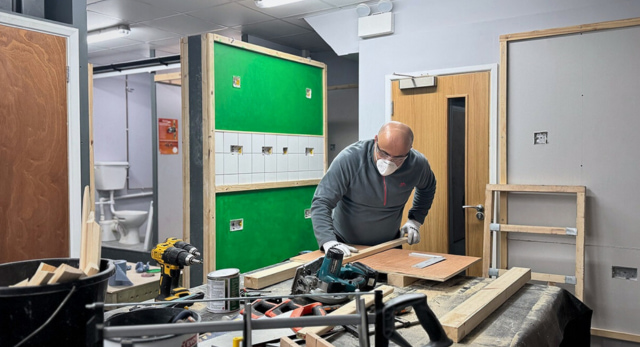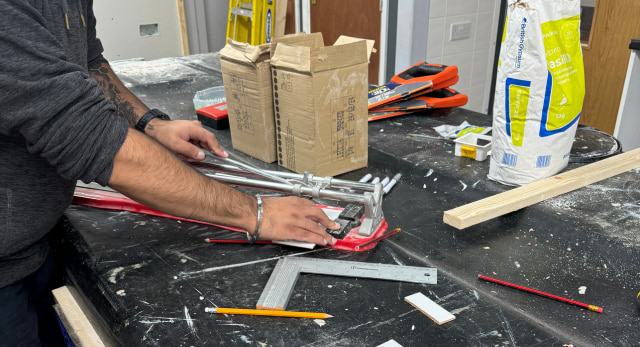The UK government has unveiled an ambitious plan to tackle the construction industry’s skills shortage, pledging a whopping £600 million investment to train up to 60,000 new construction workers by 2029. This initiative is crucial to support the government’s bold goal of building 1.5 million new homes and revitalising the country’s infrastructure.
The Housing Challenge
The target of 1.5 million new homes by 2029 is no small feat. It’s a response to the UK’s ongoing housing crisis, where demand for affordable homes far outstrips supply. This massive building programme isn’t just about putting roofs over heads; it’s about creating communities, boosting the economy, and providing opportunities for countless families to own their own homes.
Why This Matters
The construction sector is facing significant challenges. With over 35,000 job vacancies and more than half of these positions unfilled due to a lack of required skills, the industry is crying out for fresh talent. This skills gap isn’t just a number on a page – it’s a real obstacle to building the homes and infrastructure that the UK desperately needs.
Breaking Down the Investment
So, where exactly is this money going? Let’s take a look at some of the key areas:
- Technical Excellence Colleges: £100 million will fund 10 new colleges dedicated to construction training.
- Expanding Existing Courses: £165 million will help colleges offer more construction-related courses.
- Skills Bootcamps: £100 million will be invested in sector-specific bootcamps.
- Foundation Apprenticeships: Launching in August 2025, these will receive a £40 million boost.
- Industry Placements: Over 40,000 placements for Level 2 and Level 3 learners will be funded annually.
The 1.5 Million Homes Vision
The government’s commitment to building 1.5 million new homes is not just about quantity; it’s about quality and sustainability too. These homes will need to be energy-efficient, built to last, and designed to meet the diverse needs of the UK population. This presents an exciting challenge for the construction industry, requiring innovation in building techniques, materials, and design.
Chancellor Rachel Reeves said:
“We are determined to get Britain building again, that’s why we are taking on the blockers to build 1.5 million new homes and rebuild our roads, rail and energy infrastructure.”
And went on to say:
“But none of this is possible without the engineers, brickies, sparkies, and chippies to actually get the work done, which we are facing a massive shortage of. We’ve overhauled the planning system that is holding this country back, now we are gripping the lack of skilled construction workers, delivering on our Plan for Change to boost jobs and growth for working people.”
What This Means for Aspiring Construction Workers
If you’ve ever considered a career in the construction or building services sectors, now might be the perfect time to take the plunge. With this significant investment and the massive house-building programme on the horizon, there will be more opportunities than ever to gain the skills and qualifications needed to succeed in the industry.
For instance, Logic4training offers a range of courses that could help you kickstart your career in construction. Our Essential Site Skills course is an excellent starting point for those looking to gain a broad range of practical skills, from using power tools to tiling and plastering.
The Bigger Picture
This investment isn’t just about filling job vacancies – it’s about future-proofing the UK’s construction industry and ensuring we have the workforce to deliver on the 1.5 million homes target. As Chancellor Rachel Reeves put it, “We are determined to get Britain building again”. By addressing the skills shortage, the government hopes to boost economic growth, create well-paid jobs across the country, and tackle the housing crisis head-on.
Looking Ahead
While this investment is certainly a step in the right direction, it’s important to remember that solving the skills shortage and building 1.5 million homes will require ongoing effort and collaboration between the government, industry, and educational institutions.
As we look towards 2029 and beyond, it’s clear that the construction industry will play a crucial role in shaping the UK’s future. With this significant investment in skills and training, coupled with the ambitious house-building target, the sector is poised for growth, innovation, and exciting career opportunities.
For those interested in joining the building services sector, our building services courses in plumbing, gas, electrics, renewables, refrigeration, smart metering and apprenticeship programmes offer a fantastic opportunity to gain valuable skills and help the industry meet the target set out by the government.
Whether you’re a school leaver considering your options or someone looking for a career change, the construction industry is calling. Will you answer and be part of building the UK’s future?
FAQs
What types of homes will be included in the 1.5 million target?
The 1.5 million homes target will likely include a mix of housing types, from affordable homes and social housing to private developments. The exact breakdown hasn’t been specified, but the goal is to address housing needs across different sectors of society.
How will this house-building programme impact the environment?
The government has emphasised the importance of sustainability in new builds. This means many of these homes will likely incorporate energy-efficient designs, sustainable materials, and possibly features like solar panels or heat pumps to reduce their environmental impact.
What qualifications do I need to start a career in the trades?
The qualifications you need depend on the specific role you’re interested in. For entry-level positions, you might not need any formal qualifications. However, for more specialised roles, you may need GCSEs, A-levels, vocational qualifications like BTECs, or a university degree. Apprenticeships are also a popular route into the industry, combining on-the-job training with classroom learning.
Are there opportunities for career progression in construction?
Yes, the construction industry offers excellent opportunities for career progression. Many people start in entry-level positions and work their way up to management roles. There are also opportunities to specialise in specific areas or move into different sectors within the industry.
What skills are most valued in the trade industries?
While specific technical skills vary by role, some universally valued skills in the trades include problem-solving, teamwork, communication, attention to detail, and adaptability. Physical fitness and manual dexterity are also important for many hands-on roles.
Is the trades industry suitable for women?
Absolutely. While historically male-dominated, the trades are actively working to increase diversity. There are opportunities for women in all areas of construction, from trades to professional roles like engineering and project management.
How can I gain experience in the construction industry?
There are several ways to gain experience, including apprenticeships, internships, work placements, and entry-level jobs. T Levels and traineeships are also excellent options for young people looking to enter the industry.









